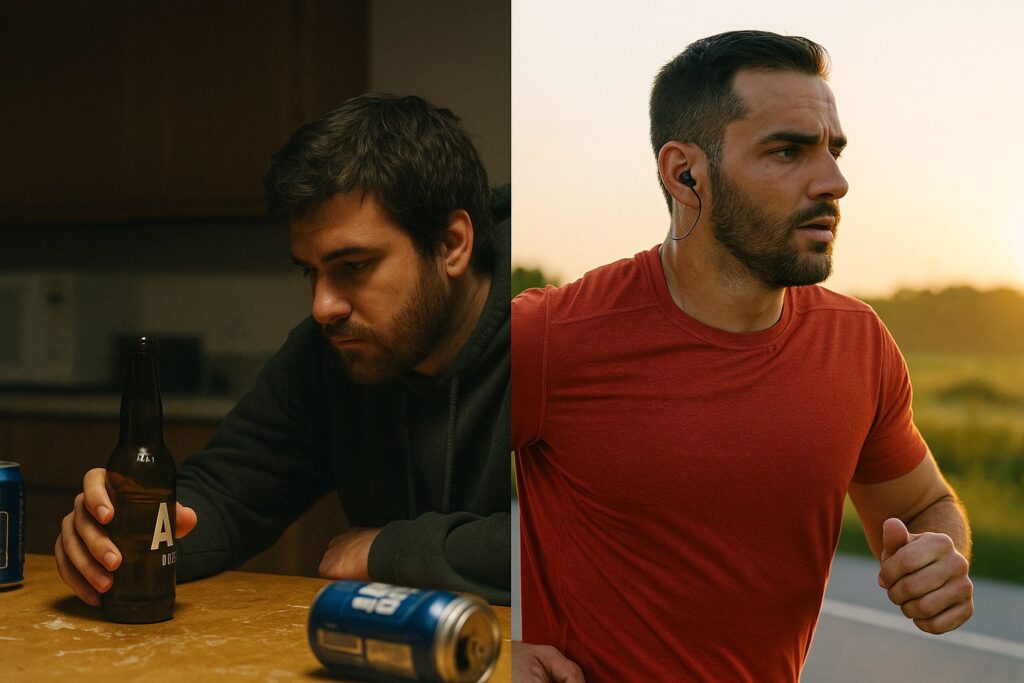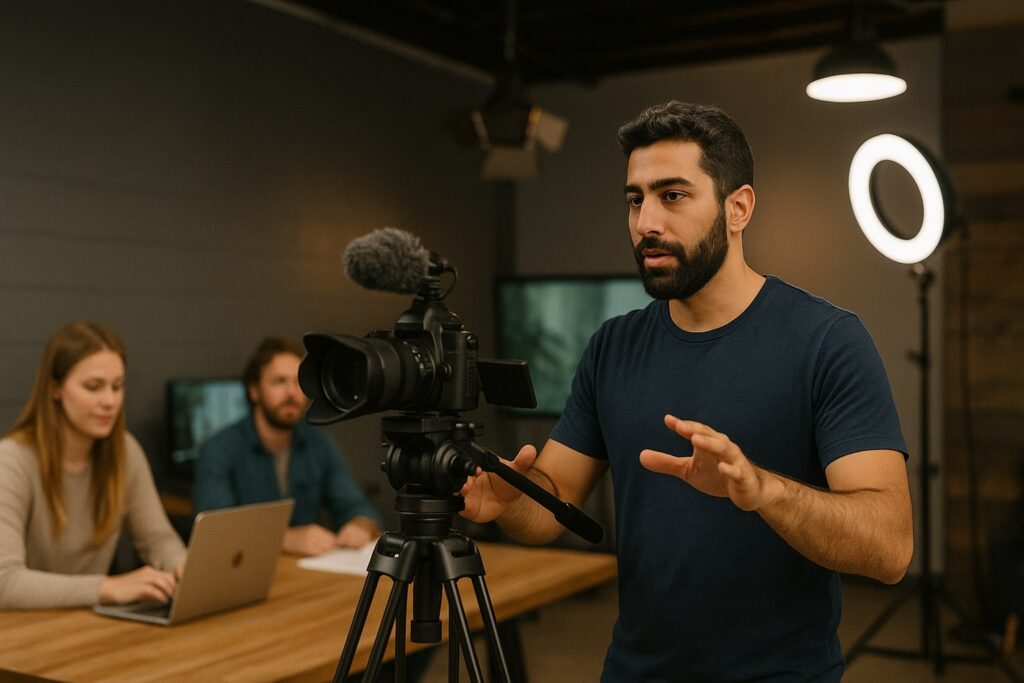“Addiction is not a choice anyone makes, but a response to pain.”
— Dr. Gabor Maté
What if your biggest fuck-up was actually the door to your dream life?
That’s not a motivational poster. It’s the real-life arc of Hassan Khan—a former coke-addicted creative stuck in the gray haze of Springfield, Missouri—who now runs a thriving video production company in Austin, Texas.
This isn’t just a story about addiction recovery. It’s about burning down who you were to become who you could be. A story of personal transformation, raw discipline, and saying yes to an impossible offer from a no-nonsense mentor.
If you’ve ever found yourself stuck in patterns you swore you’d outgrow, this is your wake-up call.
From Parties to Pints and Lines: The Beginning of the Spiral

Hassan didn’t wake up one morning and decide to wreck his life. Like many of us, his descent was slow, disguised as fun.
He was “the party guy” in high school—a weekend warrior on a mission to blackout. Underneath that persona? A quiet rebellion against his conservative Muslim upbringing, where alcohol was forbidden.
“It was always a challenge to get as drunk as possible on a Saturday,” Hassan admits.
College didn’t help. The drinking escalated. Then came the cocaine. What started as a recreational boost turned into a daily ritual—lines before work, tallboys after.
“I just needed to feel not sober,” he reflects. “That was basically what it was”.
The spiral was fast and brutal: job loss, two DUIs, and a breathalyzer installed in his car—a daily humiliation that mirrored his internal chaos.
Key Takeaway: Addiction often begins as escape and morphs into survival. The more isolated you become, the harder it is to see a way out.
The Rock Bottom Nobody Sees
Marc Lewis, PhD, a neuroscientist and former addict, describes addiction as “learned behavior that becomes deeply wired into the brain’s reward system.” You don’t erase it with willpower alone—you rewire it through new experience and identity.
For Hassan, the rewiring began with pain. His relationships imploded. He was drinking vodka in a Mountain Dew bottle just to make the day tolerable. He’d burn bridges, then wallow in self-hatred.
And yet, in the darkest moments, something else was happening.
He was still showing up for small creative gigs. Still clinging to the belief—however faint—that he had more in him.
This sliver of belief was all that was needed.
Enter the Mentor: Why Tough Love Works
Then came Brody Kern—a former addict turned business coach. Brody didn’t coddle Hassan. He didn’t hand him a paycheck. He offered him a challenge:
“I’ll give you a job. But you have to do whatever I say for three months. And you have to work for free”.
Read that again.
Three months. No pay. Total obedience.
And Hassan said yes.
Why? Because someone finally believed in him—not for who he’d been, but for who he could become.
“Brody was probably the first person who saw straight through me. His belief in me hit different”.
Blockquote Insight:
“Can you trust in my trust in you?” — A mentor’s belief can be the first blueprint for your self-worth.
Expert Perspective:
Valerie Mason-John, co-founder of the Eight Step Recovery program, emphasizes the importance of community and accountability in recovery:
“Mindfulness and connection—not isolation—are the antidotes to addiction.”
Addiction Recovery Begins with New Identity
Brody wasn’t just a mentor—he was a firestarter.
He dragged Hassan to 5 a.m. runs, marathons, and one-hour saunas. Hassan was still vaping, still clinging to old habits. But the pain of transformation was now replacing the pain of staying the same.
“Running really catapulted me. It made me quit cigarettes. I dropped 70 pounds in like four months”.
This wasn’t about detoxing. It was about becoming someone new.
Dr. Gabor Maté’s trauma-informed work explains this well:
“Addiction is not the primary problem. It’s an attempt to solve a deeper one—emotional pain, disconnection, trauma.”
For Hassan, those deeper wounds were never fully seen or supported. Until Brody.
Bold Takeaway:
💥 Addiction recovery doesn’t start with quitting. It starts with rebuilding your sense of worth—through action, structure, and support.
Personal Transformation Requires Discomfort
Here’s what most self-help misses: discipline isn’t about grit. It’s about identity. And identity is formed in discomfort.
“I used to think if I wasn’t stressed, something was wrong. I’ve become addicted to discomfort as a metric for growth”.
That might sound unhealthy. But in context, it’s profound.
Hassan didn’t just build new habits—he stepped into an entirely new community. One that didn’t tolerate excuses. One where 21-year-olds ran million-dollar businesses. One that forced him to level up or fall behind.
This is what Marc Lewis means when he says recovery rewires your brain.
Recovery Tactic #1: Habit Overhaul
- Run daily, even a mile
- Trade alcohol for structured challenge (sauna, gym, jiu-jitsu)
- Create a digital fast to reset dopamine tolerance
- Track each day sober with a visual calendar
Recovery Tactic #2: Social Rewiring
- Cut ties with old party friends
- Build new peer groups based on growth, not escapism
- Make vulnerability a practice (therapy, men’s groups, journaling)
From Videographer to Visionary: Entrepreneurship as Healing

Five years later, Hassan isn’t just sober. He’s thriving.
He co-founded Content Factory—an elite production company that attracts seven-figure entrepreneurs, high-level coaches, and creatives from across Austin. He’s not just making videos. He’s building vision.
“I didn’t want to be the creative director at Wake Up Wealthy. I wanted to be in the same league as the clients”.
This is what entrepreneurship offers to the recovering addict: a space where your pain becomes your product. Where your past becomes your positioning.
Bold Insight:
🛠 Entrepreneurship can be the new addiction—but when built with structure and purpose, it becomes a vehicle for freedom.
Resistance Points You’re Probably Facing
- “I don’t have a mentor like Brody.”
You don’t find great mentors. You earn access by offering value and being coachable. Ask: who would I work for free to learn from? - “I’m too far gone.”
Hassan was waking up to lines of coke. You’re not beyond saving. You’re beyond waiting. - “I’m not disciplined enough.”
Discipline is a system, not a trait. Start with one non-negotiable habit a day. - “I’ll lose my friends.”
You might. But you’ll gain brothers.
Self-Assessment: Where Are You in the Cycle?
Check all that apply:
– wake up with anxiety or dread more than clarity
– I use substances or screens to avoid emotion
– I feel stuck in cycles of burnout and distraction
– I crave a deeper purpose but don’t act on it
– I’ve considered changing everything but haven’t yet
If you checked 3 or more:
You’re not broken. You’re just overdue for an identity shift.
Metrics of Progress: How to Know You’re Changing
You’ll know the transformation is real when:
– You feel discomfort and lean in, not out
– You say “no” to what once defined you (drinks, distractions)
– You stop needing others to approve your direction
– Your mornings start with clarity, not chaos
– You attract a different tribe—one that expects more from you
Bold Reminder:
🌱 Growth isn’t loud. Sometimes it looks like sleeping on a bean bag and waking up early to run alone.
Community: Why Brotherhood Matters More Than Willpower

Hassan didn’t get sober alone. He immersed himself in a circle of high-performing men through Wake Up Wealthy.
These weren’t just “networking buddies.” These were the brothers who pushed him. Who saw who he could become. Who reminded him of his commitment when he forgot.
“Everyone was chasing growth. That became the new normal”.
Valerie Mason-John puts it bluntly:
“Isolation feeds addiction. Connection dissolves it.”
If you want to heal, stop trying to do it alone. Find a mastermind. Join a men’s group. Build or borrow a support system that holds you to your highest standard.
Final Thoughts: One Offer Can Change Everything
Looking back, Hassan’s whole life pivoted on a single moment:
“I’ll give you a job—but you have to do whatever I say, and work for free for three months.”
Most people would’ve walked.
He said yes.
Not because he was ready—but because he was willing.
So the real question is:
💥 What are you willing to say yes to today?
🔥 Your Turn: Watch, Reflect & Join the Conversation
You’ve just read Hassan’s journey from addiction to purpose — now it’s your move.
🎥 Watch the full interview here:
👉 Beating Addiction to Building Your Dream Life | Hassan Khan – Episode 5
💬 Comment Below:
What’s your biggest takeaway from Hassan’s story? What part of his transformation resonated most with where you are right now?
❤️ Like, Subscribe, and Stay Connected:
– Subscribe to our YouTube channel for weekly deep dives: @BrianBegin
– Join the movement at brianbegin.com for exclusive content, embodiment tools, and breakthrough coaching opportunities.
This isn’t just content—it’s your invitation to start your hero’s journey.
Because the only way out… is in.

